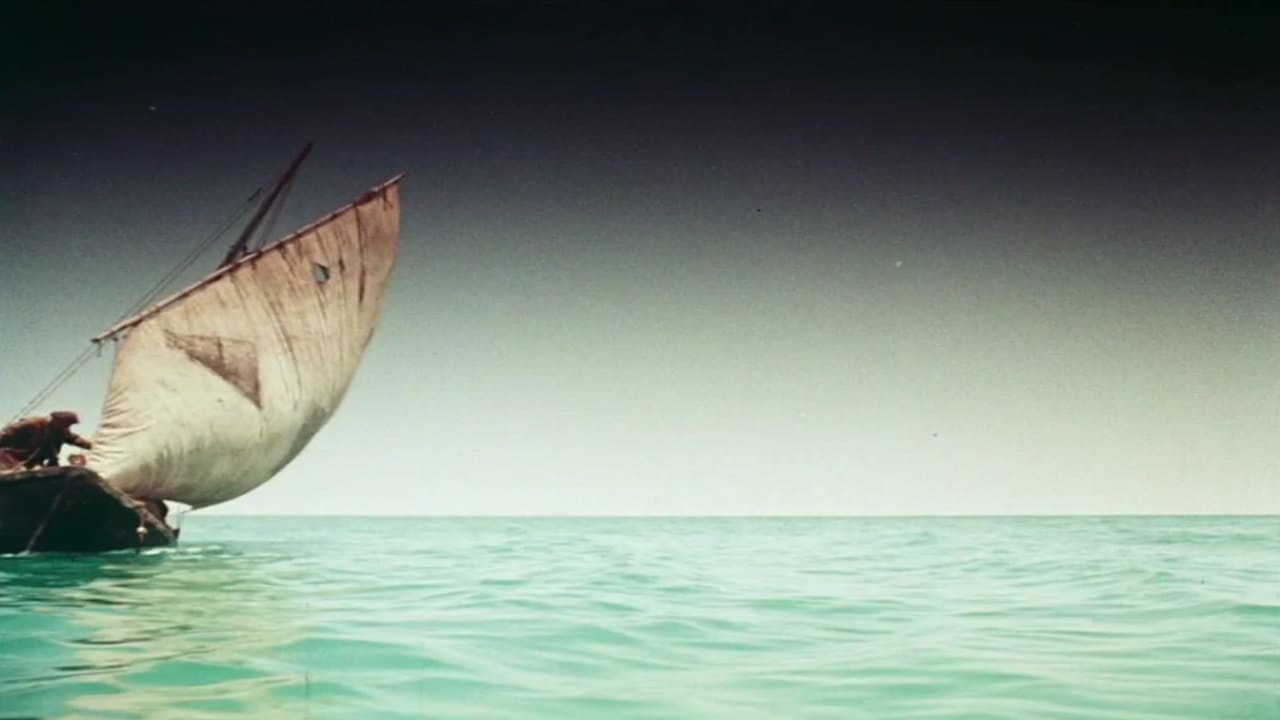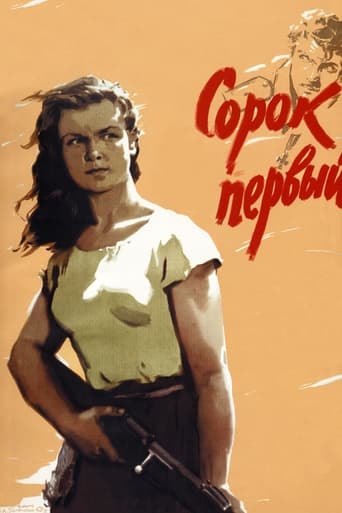



Plot so thin, it passes unnoticed.
Clever and entertaining enough to recommend even to members of the 1%
View MoreThere are moments that feel comical, some horrific, and some downright inspiring but the tonal shifts hardly matter as the end results come to a film that's perfect for this time.
View MoreIt is encouraging that the film ends so strongly.Otherwise, it wouldn't have been a particularly memorable film
View MoreThe Forty First is a film about two star-crossed lovers who meet a tragic end as a consequence of the time period in which they belong. Set in the years during the Russian Civil War, the film follows Maryutka a red army soldier whose group captures Vadim, a cadet for the white army whom she eventually develops feelings for after connecting with him on a deeper level. The opening credit scenes with its roaring waters and its gloomy music catches the attention of the viewer immediately with its foreshadowing of the tempestuous times to come. The film is more adapted to what films are today so it is easy to become engrossed in it. There are very notable differences in the style of directing within this movie as opposed to the films that were produced during the Stalinist time period. For example, the characters all seem much more individualistic and express their opinions more openly. Of course considering the nature of the film, it being for propaganda purposes, there are still pro revolutionary ideals presented through the unwavering determination that Yevsyukov has to continue for the sake of the revolutionary cause and of course the ending scene in which Maryutka gives the ultimate proof of where her loyalties lie. There is a good use of the space around the characters which turns out to be a great cinematic tool. There are shots of both the arid dessert and the tempestuous sea. It manages to capture both its beauty, as Maryutka noted when comparing it the sea to Vadim's eyes, and its power of destruction when it killed two men and stranded them on the island. The whole storm scene was strategically captured through different angles and distances, further exemplifying the success of this story as a film. Despite the ending which was both astonishing and expected, this film was enjoyable to watch. With all of its elements it ends up being a haunting tale.
View Morelike many films from the same period, the poetry of image saves it from the ideological web. because the basic aesthetic virtues are only parts of a splendid love story in the time of war. because the story is just support for seductive images. a film about borders and feelings. honest, fresh, melancholic, bitter. but useful for discover the spirit of a slice of history and the art of a great director. for discover the nuances who are only fruits of each detail. and to meet two interesting actors. a film about war, hate, love and strange form of peace. and, sure, about the duty. as piece who defines the characters. the last scene remains a long time in memory. not only for the drama but for the profound poetry who transforms the political command in seed of a story after the film's story. a film about the most precious emotion. made in one of the most inspired manners.
View MoreThe Forty First is pretty much a Soviet Romeo and Juliet. Romance aside, the film offers some praiseworthy elements cinematographically. While detail-oriented aspects of Soviet montage are absent, some long shots of Red soldiers stumbling through desert dunes have a desolate beauty, and scenes in a small Kazakh village are wonderfully authentic. However, bulk of the story takes place in aesthetically blank isolation, where romance and ideology can clash beyond of the confines of armed conflict. Like Chapaev, The Forty First introduces the Whites through a prisoner of war. Unlike Chapaev though, and in a step away from Stalinist film standards, the captured counterrevolutionary lieutenant is unrepentant, and yet still a sympathetic character. The Red and White forces as a whole are depicted in the typical fashion; the Whites as lofty bourgeoisie officers performing acts of unjustified brutality, the Reds as under-supplied and struggling in the face of insurmountable odds. However, the prisoner, Lieutenant Otrok, is merely a wealthy intellectual. Otrok pines for the loss of his pedagogic comfort, not the fall of the monarchical system, and in this sense he is a relatable character. He is apologetic for the conditions that caused the war, and views his captors with good natured derision rather than hatred. We are treated to a well crafted, if utterly predictable, romantic progression as the dogmatic sniper Maryutka, assigned to guard the prisoner, is slowly enchanted by Otrok's charm and intelligence. The film is not a story of bourgeois contamination, though, as Maryutka remains disgusted by the Lieutenant's detachment from the ideological issues of the revolution. The film ultimately determines that regardless of motivation and culpability, the proletariat and bourgeoisie are incompatible. Admittedly, the romantic progression at the center of The Forty First is unremarkable from a modern perspective. However, the film deserves praise for addressing the generally rigid revolutionary genre in a novel and more liberal manner.
View MoreMuch can be said about the range of emotions found in today's movies. They've certainly become better at promoting a cool atmosphere, adrenaline rushes, making plots that are cleverly built up to a climax, and fitting in as many square centimetres of skin as possible into the film. Some emotions are, however, totally, and I mean totally, disregarded. Intense melancholy, an intense sense of longing and sensations of intense pity for the characters are now nowhere to be found. This movie has all of that in spades, making it radically different from today's European and American movies. It is more "theatrical" than today's more "realistic" films, but for God's sake, don't let that put you off. An incessantly beautiful soundtrack sweeps through the entire film, and the pictures are stunningly beautiful, though in a Russian way that can simply be labelled "different". This film was an eye-opener to the fact that I've seen so many movies that ultimately have left me nearly indifferent to the fate of the characters, and to some loose theory that melancholy and pity are closely related. Everyone should hunt this movie down. The ending will haunt you forever. Anything you watch afterwards will seem like ridiculous attempts to give you cheap thrills.
View More